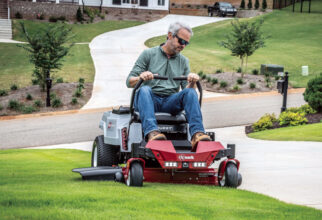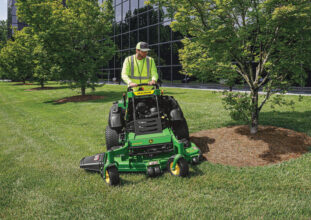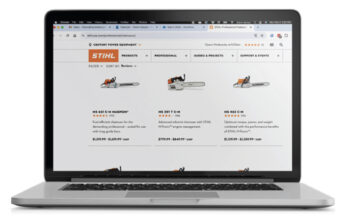The Tension is Real
And it can be lowered. The Story of Manufacturer-Dealer Relations.
By Glenn Hansen
“In the past, manufacturers relied on independent power equipment dealers to deliver messages. If you can convince the dealer channel about your products, they will talk to and convince customers,” said Carlos Haddad, vice president and general manager of Husqvarna’s North American professional business unit. “Then along comes social media, and the messaging power of manufacturers increased directly to consumers.” Haddad said this mirrors the change made by U.S. politicians who used to rely on journalists to broadcast their messages. Then the 2008 presidential election happened, and social media became the direct-to-consumer opportunity. Today, like voters, shoppers begin their product research online and communicate directly with brands.
“Manufacturers want to be in control of messaging to consumers,” said Haddad, “but so do dealers. Both want to be in the driver’s seat of consumer communication. This has caused tension.”
“We still need to communicate with dealers,” he added, “while we communicate directly with customers who no longer begin their research in store.”
Communication Triangle
I started the research for this topic assuming that relations between OPE dealers and manufacturers need improvement. That’s a big generalization, considering there are thousands of OPE dealers in the U.S., and dozens of manufacturers, ranging from established giants such as Toro, to niche manufacturers such as RC Mowers. But then I backed away from my assumption and asked nearly a dozen manufacturers, “Is this an issue? Do you discuss ‘dealer relations’ in your corporate meetings?” Answers ranged from a definite “Maybe” to “Absolutely.”

“Dealer relationships have always been, and will always be, a key strategic focus area for Bobcat,” said Steve Ross, senior director of grounds maintenance equipment commercial business.
A few of the manufacturers I spoke with hesitated to frame it as “an issue,” sensing a negative connotation. “I don’t know if it’s an issue,” said John Vranches, division sales manager for Takeuchi US, “but at the end of the day, you must have a manufacturer and a distributor/dealer, and they need to be independent, not one owning the other.”
And some were more direct. “Oh yes, it’s an issue. And not just for Makita,” said Dennis Stauch, vice president of OPE sales for Makita. “The independent dealer is the backbone of the industry. They have the relationships with end users, and we need to help the dealers manage that.”
I asked dealers, too, if they believe there are issues with the relationship. “I don’t think the manufacturers understand,” said Greg Paul, of Paul’s Lawn and Garden in Massillon, Ohio. “I hope they hear this, and I wish they would be with us for a day or two.”
“We have really good relationships with some manufacturers,” said Britny Funk, sales manager at Belgrade Sales and Service in Bozeman, Montana, “but there are concerns. When we talk about Toro, it seems they really don’t care about us as much as the big-box stores.”
“For the most part, distributors seem to do a better job than some of the OEMs,” said Mark Bailey or Buck’s Saw and Lawn Equipment in Novato, Calif. “I don’t get the warm feeling that they really care about my business. Honestly, most of them do a good job, but one that stands out lately is Honda. I do not have a good feeling about them lately.”
What Do Dealers Want?
I understand that any dealer might complain about almost any manufacturer on a given day, and others might praise that OEM. While I gave dealers and manufacturers a chance to be heard, whether on a call or in a written response, the point is not to make this a record of complaints.
With the understanding that the OEM-Dealer relationship is maybe-probably-definitely an issue to be improved, we asked OPE dealers what they want. For context, the dealers who responded were all multi-brand businesses, with roughly 40 percent carrying between 2 and 4 brands, about one-third carrying between 5 and 9 brands, and about 25 percent carrying 10 or more brands.
Two charts show what dealers want, through two questions. First, what do manufacturers do well? And second, what do manufacturers do wrong? Dealers want to be respected as independent service-focused businesses. And they want the ability to earn a fair profit margin. At first, one could be surprised that the same topics can answer both Doing Well and Doing Wrong questions. But it means that when manufacturers do this right, it’s great, and when they do it wrong, it’s really bad. It also suggests that – though our dealer respondents didn’t name names in these specific questions – each dealer-manufacturer relationship is unique, with variables that include individual OEM or distributor field representation.

Dealers indicated they appreciate prompt support on service and warranty items, and that frequent communication is important. Those two are related, with warranty support often coming down to quick and thorough communication. I spoke with both manufacturers and dealers about these things. (And manufacturer readers will see here that it’s not all about complaints.)
Respect for Independent Businesses
The word “respect” is loaded here, but it boils down to this: Dealers want to feel they are at least as important as the big-box chain stores. “The independent dealer is gradually being crowded out with online sales and big-box stores as many (manufacturers) are offering products for them,” said one dealer, anonymously, through the survey we conducted. More directly, Britny Funk from Montana pointed to Toro, saying, “They say we will get warranty work (following sales from big-box stores), but the people who do come in for service visit us with a negative attitude right away. And it makes it difficult to take care of our customers.”

I spoke with Chris Vogtman, managing director in Toro’s residential and landscape contractor division. “From a customer care and customer service standpoint, we have a full support team and they support dealers all day long,” he said. By “customers” Vogtman means Toro dealers and end users. He added, “We’re in a relationship business, and we put a lot of focus on that. From a warranty perspective, ours are the tops, and we honor those for both dealers and customers. Not every manufacturer can offer this level of support.”
“Easy to Do Business With”
Does this just mean that they will need to “agree that they disagree” here? Vogtman said, “One of our core goals is to be easier to do business with. We want to remove that friction for dealers. We know we have work to do, and we want to go from Good to Great.” He said that Toro is making investments in communication tools and practices because “we want to make the dealer’s life easier.”
Toro might not have to look too far for answers, at least according to Britny Funk. “Exmark is the most phenomenal brand relationship we have, which is interesting,” she said. Toro acquired Exmark mowers in 1997. “They are separate from Toro,” she said. “They sell differently and treat us differently.”
Respect is also about online sales, at least for most of the dealers we spoke with. When beginning my research for this story, I googled this: “manufacturer dealer relations in OPE.” I found an old-but-seemingly-popular article from Harvard Business Review that quoted then CEO of Caterpillar, Donald Fites, who said, “We’d sooner cut off our right arm than sell directly to customers and bypass our dealers.” This article is from 1996, so Fites said that back when AOL was mailing CDs to people’s homes, well before online shopping became a thing. Today customers can buy Caterpillar parts online and have them shipped directly to their home, no dealer involvement required.
A Different World Today
Times change, though several manufacturers who sell online do require that customers pick up goods at the dealer. Kubota, for one, sells through its “K-Com” platform. “Customers have to go through a dealer, said Don Lowe, Kubota’s executive director of sales. “We do not want customers coming to us directly. For wholegoods, we are still analyzing that, but we will never go direct. And we’re not interested in selling through big box stores.”
Stihl has taken a leadership role in providing an online sales framework that seems to support independent dealers. “We have a policy allowing dealers to sell online a few different ways,” said Jeremy Krueger, Stihl director of business development. “Dealers can have a website vetted for Stihl standards and compliance, enabled with ecommerce. Customers can buy and either pick up items in store, have dealers deliver the products personally, or a dealer can ship the Stihl products.” Dealers are not required to participate, Krueger emphasized. “It’s their choice,” he said. “We saw a big uptick during the pandemic. It gives dealers a storefront that’s open 24-7. It’s not a huge cash cow for dealers; it’s more incremental.”
A few dealers we surveyed pointed to Stihl as a fair and understanding partner. “Stihl supports the dealer with exclusivity,” said one. “They understand our business and offer us a decent profit opportunity,” said another.
Profit Margins
Dealers we surveyed and spoke with were consistent in their desire for profit margins. And it’s a deeper category than just profit per wholegoods sale. The profit margin topic incorporates respect for business independence, consistent communication, product availability, warranty support, plus the topic of fees for marketing.
Some manufacturers help with profit potential by focusing on high-priced product. “We support dealers by pricing our products to be high margin,” said Tim Kubista, vice president of sales and marketing for RC Mowers. Few manufacturers can do that across product lines.
For manufacturers who compete with a broader range of products and price points, such as Makita and its growing OPE line, customer service might be the key to profitability. “Entrepreneurial dealers are evolving,” said Dennis Stauch, vice president of OPE sales for Makita. “Service is a big opportunity for dealers to build more relationships and sell more products. Some dealers will service just their own products and their biggest customers first, and that’s fine, but they should be open to other buyers and brands.” He points to Makita’s factory-service centers as an opportunity to relieve a dealer’s service-shop backlog and make service profit.
The Big Box?
On the topic of Makita tools in big-box stores, Staunch said that the manufacturer segments products as much as possible and sets price parity for all dealers with a Minimum Advertised Price (MAP) policy. “We have people checking on this, but it’s difficult,” he said, “and that’s why it’s important for OPE dealers to add more value to customer relationships.”
For some OEMs, this is foundational to the relationship. “It’s important for us that our dealers remain profitable,” said Vranches of Takeuchi. “Dealers can make money with our products. Still, the relationship is contractual, and both parties have responsibilities.”
A couple dealers we surveyed gave special shout-outs to distributors, a group in this relationship I didn’t mention. “I would actually highlight Pace, a distributor,” said one dealer. “They treat us as a customer. They make the OEMs they distribute look good to their dealers. They share in our struggle and actually help us. And they seem to understand that if we make money, they will make money.”
Good Communication
The quality of communication is not judged by one or two messages, but by a long-term process. “We’re all dealing with troubles, from labor shortages to supply chain and more. But at the dealer end, we’re often kept in the dark,” said Greg Paul. “If we had better communication, things would be different. Honda has had a stop sale on mowers for several weeks, and I don’t have any more information on what to do.” A few dealers pointed out the topic of Honda push mowers, and the “issue” was more about lack of communication than the actual stop-sale matter.
One dealer responded to our survey to acknowledge the work of Stanley Black & Decker and its Cub Cadet brand. “They demonstrated they will continue LAB (Listen/Act/Build),” said the dealer, “a policy that helped turned the Cub Cadet brand around over the past decade. They listen to their dealers and customers to make products and programs better.”
The manufacturers who understand this will have an advantage. “One of the biggest things, and we talk about it frequently,” said Christin Wam, senior director of marketing at Briggs & Stratton, “is the relationship and communication. I have the strong opinion that when you can help a dealer grow their brand, it will help grow ours too. And dealers can contact us anytime.”
While communication is not a single message, the delivery and receipt of messages can cause problems today. Back to my discussion with Husqvarna that started this story, and it’s clear that message delivery needs some work. “Who is opening our emails? Who is looking at the communication?” Those are questions raised by Carlos Haddad of Husqvarna. “I’m not placing the blame on dealers. We need to make our messages as simple and clear as possible. And that’s why we have field staff talking with dealers.”
A few dealers I heard from share the same view as Greg Paul, the Ohio dealer who has become a good source of information for OPE Business. “I think decisions are being made with an ivory tower mentality,” said Paul. While some manufacturers may have an abundance of MBAs and white-collar execs in corner offices, the concept of misunderstanding might be cleared up with more frequent communication.
“Sure, some of us have MBAs,” said Vogtman from Toro. “But we don’t just sit behind desks. We’re into the business and the product. I’ve mowed my son’s baseball field with our products for years. We expect Toro employees to know the products and the business.”
Let’s promise to talk with each other more often.



